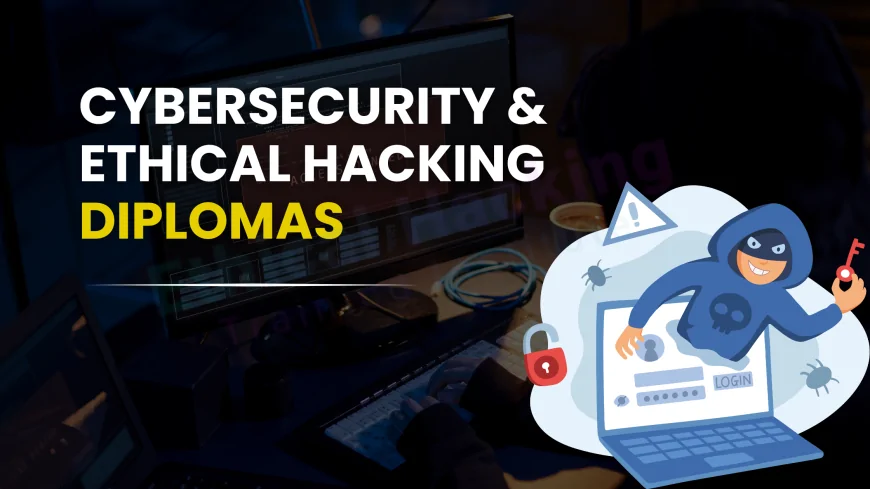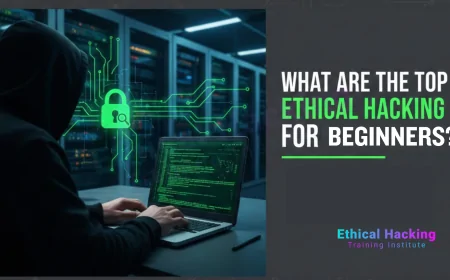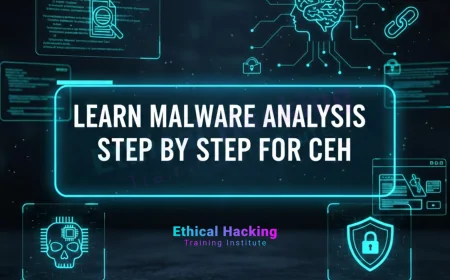Ethical Hacking and Cybersecurity Diploma Programs in Pune | 2025 Guide
Explore top ethical hacking and cybersecurity diploma programs in Pune in this 2025 guide. Learn about course structure, career scope, real-world training, certifications, and job prospects — all without promoting specific institutes.

In an increasingly digital world, cyber threats are becoming more frequent and sophisticated. Whether it's data breaches, ransomware attacks, or network intrusions, organizations across all sectors are in dire need of skilled cybersecurity professionals. This rising demand has led to a surge in ethical hacking and cybersecurity diploma programs — particularly in tech-centric cities like Pune.
Pune, often referred to as the Oxford of the East and a growing IT and education hub, offers an ideal ecosystem for cybersecurity learning. If you are looking to break into this high-demand industry or upgrade your existing IT skills, diploma programs in ethical hacking and cybersecurity could be your launchpad.
In this comprehensive guide, we’ll explore what these programs entail, who they’re for, and how they prepare you for the real world — without promoting specific institutions.
What Is Ethical Hacking?
Ethical hacking, also known as penetration testing or white-hat hacking, is the practice of intentionally probing computer systems, networks, and applications to identify vulnerabilities — all legally and ethically. Unlike malicious hackers, ethical hackers use their skills to strengthen cybersecurity defenses and protect digital assets.
An ethical hacker must understand how malicious hackers think, but also have a firm grasp of defensive strategies and compliance frameworks. Diploma programs in this field teach these concepts from the ground up.
What Is a Cybersecurity Diploma Program?
A cybersecurity diploma program is an academic or vocational training program designed to teach the principles and practices of defending information systems from attacks. These programs are typically shorter than degree courses and are more focused on job-ready skills.
Many of these diplomas offer specializations in ethical hacking, network security, cloud security, incident response, and compliance — making them highly valuable for professionals and students alike.
Why Choose Pune for Cybersecurity Education?
Pune has rapidly become one of India’s premier tech destinations. With its proximity to Mumbai, a strong IT infrastructure, and an abundance of educational institutions, Pune offers a rich environment for cybersecurity learners. Here's why it's a strategic choice:
1. Growing Tech Industry
The city hosts numerous IT parks and software companies, making it a prime location for internships, training, and job placements.
2. Affordable Living and Learning
Compared to metros like Bangalore and Mumbai, Pune offers relatively lower living and education costs while still maintaining high-quality training environments.
3. Industry Exposure
Many cybersecurity diploma programs in Pune are connected with corporate training partners, offering learners real-world experience through projects and simulations.
Key Components of a Diploma in Ethical Hacking and Cybersecurity
Whether you're a beginner or an IT professional, diploma programs usually follow a structured path from foundational knowledge to advanced hands-on training. Here are common modules you can expect:
1. Introduction to Information Security
-
Basics of information security
-
Threats and vulnerabilities
-
CIA triad (Confidentiality, Integrity, Availability)
2. Networking Fundamentals
-
TCP/IP model
-
Subnetting and routing
-
Network devices and protocols
3. Operating System Security
-
Windows and Linux architecture
-
OS vulnerabilities
-
Hardening techniques
4. Ethical Hacking Tools and Techniques
-
Footprinting and reconnaissance
-
Scanning and enumeration
-
System hacking
-
Malware analysis
-
Password cracking tools
5. Web Application Security
-
SQL injection
-
Cross-site scripting (XSS)
-
Cross-site request forgery (CSRF)
-
OWASP Top 10
6. Network Security and Firewalls
-
Intrusion Detection and Prevention Systems (IDS/IPS)
-
Firewalls and VPNs
-
Securing wireless networks
7. Cryptography
-
Symmetric and asymmetric encryption
-
Hashing algorithms
-
Digital signatures and certificates
8. Cloud Security
-
Security in AWS, Azure, and Google Cloud
-
Identity and access management (IAM)
-
Secure cloud architecture
9. Incident Response and Forensics
-
Incident detection and reporting
-
Forensic tools and techniques
-
Legal and compliance issues
10. Capstone Projects / Simulations
-
Real-world attack simulation
-
Security audit reports
-
Capture the Flag (CTF) challenges
Target Audience
These diploma programs are ideal for:
-
Fresh graduates seeking entry into the cybersecurity field
-
IT professionals looking to specialize in security roles
-
Network and system administrators wanting to enhance their security capabilities
-
Career switchers from non-IT fields interested in cybersecurity
-
Entrepreneurs and business owners aiming to secure their digital assets
Certifications You Can Prepare Alongside
Although the focus here is on diploma programs, many also help learners prepare for globally recognized certifications, such as:
-
CEH (Certified Ethical Hacker)
-
CompTIA Security+
-
CISSP (Certified Information Systems Security Professional)
-
CHFI (Computer Hacking Forensic Investigator)
-
OSCP (Offensive Security Certified Professional)
These certifications add tremendous value to your resume and are often considered gold standards in the industry.
Hands-On Training and Real-World Exposure
A major differentiator of diploma programs in Pune is the emphasis on hands-on training. Rather than simply teaching theory, students engage in:
-
Lab-based learning: using tools like Wireshark, Metasploit, Nmap, and Burp Suite
-
Live projects: based on real attack scenarios
-
Internships: short-term roles with companies to gain corporate experience
-
CTFs and Hackathons: competitive platforms to test hacking skills
This applied learning approach ensures that graduates are job-ready and can confidently face real-world challenges.
Duration and Mode of Delivery
Most diploma programs range from 6 months to 1 year, depending on the course depth and delivery format. The formats generally include:
-
Offline (in-classroom): Ideal for local learners who prefer instructor-led training
-
Online (live virtual classes): Great for working professionals and remote learners
-
Hybrid (blended mode): A mix of self-paced content and scheduled live sessions
With the growth of remote work and e-learning, many reputed programs now offer complete online diploma courses with certification and placement assistance.
Career Opportunities After Completing the Diploma
The scope for cybersecurity professionals is vast and growing every year. After completing a diploma in ethical hacking and cybersecurity, you can pursue roles such as:
-
Ethical Hacker / Penetration Tester
-
Security Analyst
-
Network Security Engineer
-
Information Security Consultant
-
Incident Response Analyst
-
Cybersecurity Trainer
-
Forensics Investigator
-
Security Auditor
These roles are available across sectors — including IT, finance, healthcare, telecom, and government agencies.
Salary Expectations
While salary packages depend on experience, location, and the hiring organization, here’s a rough breakdown of average salary expectations in Pune:
-
Freshers / Interns: ₹3–5 LPA
-
1–3 years experience: ₹5–8 LPA
-
3–5 years experience: ₹8–12 LPA
-
5+ years (senior roles): ₹12–20+ LPA
Professionals holding global certifications like CEH, CISSP, or OSCP tend to command higher salaries and more prestigious job roles.
Advantages of a Diploma Over Traditional Degrees
If you’re wondering why you should opt for a diploma instead of a full-fledged degree in cybersecurity, here are a few compelling reasons:
-
Shorter Duration: Diplomas are typically completed within 6–12 months
-
Industry-Focused Curriculum: More aligned with job market requirements
-
Cost-Effective: Lower tuition and living expenses
-
Hands-On Skills: Focus on tools, simulations, and real-world scenarios
-
Certification Integration: Helps prepare for global certifications
What to Look for in a Good Diploma Program
When choosing a diploma program in Pune, consider the following key factors:
-
Curriculum Depth and Relevance
Ensure the syllabus covers both foundational and advanced topics, aligned with current industry demands. -
Trainer Experience
Instructors should be certified professionals with practical industry exposure. -
Hands-On Labs and Projects
The program must include real-life projects, simulations, and lab-based tasks. -
Flexible Learning Modes
Choose a format that fits your schedule — online, offline, or hybrid. -
Placement Assistance
Good programs offer resume-building help, mock interviews, and job referrals. -
Certification Support
Look for programs that help you prepare for CEH, Security+, or OSCP.
FAQ's
1. What is an ethical hacking diploma program in Pune?
A diploma in ethical hacking in Pune is a specialized training program that equips learners with hands-on skills in cybersecurity, penetration testing, and ethical hacking. The course is designed for both beginners and IT professionals looking to build a career in protecting digital infrastructure from cyber threats.
2. Who should enroll in cybersecurity diploma courses in Pune?
These programs are ideal for BCA/MCA/B.Tech students, network engineers, IT administrators, and working professionals who want to specialize in ethical hacking and cybersecurity. Anyone passionate about preventing cyberattacks and securing information systems can benefit from this course.
3. What topics are covered in ethical hacking diploma training?
Diploma courses typically include modules like network scanning, malware analysis, system hacking, wireless security, cryptography, cloud security, and penetration testing. Most programs are aligned with international standards like CEH and offer real-world simulations for hands-on learning.
4. Are there beginner-friendly ethical hacking courses in Pune?
Yes, many ethical hacking training institutes in Pune offer beginner-level diploma courses that start with basic concepts such as networking, Linux fundamentals, and information security principles before progressing to advanced hacking techniques.
5. What are the career benefits of a diploma in cybersecurity?
Completing a diploma in cybersecurity opens doors to high-demand careers like ethical hacker, penetration tester, SOC analyst, security consultant, and digital forensics expert. These roles are among the highest-paid in the tech industry and offer long-term job security.
6. Is ethical hacking a good career choice in Pune?
Absolutely. Pune is a major IT hub with growing demand for cybersecurity professionals across sectors like banking, IT services, e-commerce, and startups. Ethical hacking skills are highly sought after to combat increasing cyber threats and data breaches.
7. How long does an ethical hacking diploma course take?
Most ethical hacking and cybersecurity diploma programs in Pune span 3 to 12 months, depending on the course intensity and learning format (regular, weekend, or online). Fast-track and self-paced options are also available for flexible learners.
8. What is the average fee for cybersecurity diploma programs in Pune?
Fees typically range from ₹25,000 to ₹85,000 based on course content, training format (online or classroom), duration, and whether certifications like CEH are included. Some institutes also offer EMI or installment payment options.
9. Do these programs include hands-on practical training?
Yes, reputable ethical hacking diploma programs in Pune include lab-based training, real-time attack simulations, capture-the-flag (CTF) challenges, and vulnerability assessments. These practical sessions prepare students for real-world cybersecurity roles.
10. Will I get a certificate after completing the course?
Yes, upon successful completion, students receive a diploma certificate in ethical hacking or cybersecurity, which adds credibility to their resume and helps in job placement or further certification exams like CEH, CompTIA Security+, or OSCP.
11. Are online ethical hacking diploma programs available in Pune?
Definitely. Several institutes in Pune offer fully online or hybrid diploma programs with live instructor sessions, recorded classes, cloud-based labs, and remote exam options—perfect for working professionals and distance learners.
12. Do Pune-based diploma programs help in CEH exam preparation?
Yes, many diploma courses are aligned with the Certified Ethical Hacker (CEH) curriculum and help students thoroughly prepare for the exam with practice questions, mock tests, and instructor-led guidance.
13. What qualifications do I need to enroll in these courses?
Most diploma programs require basic knowledge of computers and networking. However, prior experience in IT or a background in BCA, MCA, or engineering is often preferred for advanced-level content.
14. Are placement services available after course completion?
Many ethical hacking training institutes in Pune provide 100% placement assistance, resume building, mock interviews, and connect students with cybersecurity job openings in top IT companies, startups, and consulting firms.
15. Can I pursue cybersecurity training alongside my college or job?
Yes, most institutes offer weekend and evening batches, as well as self-paced online courses, making it possible to learn ethical hacking while managing college studies or a full-time job.
16. How much can a certified ethical hacker earn in Pune?
Entry-level ethical hackers in Pune can earn between ₹4–6 LPA, while experienced professionals can command salaries upwards of ₹10–15 LPA. Certifications and hands-on skills significantly impact salary potential.
17. Will I learn how to use real hacking tools in these programs?
Yes, students get hands-on experience with industry-standard tools like Nmap, Wireshark, Metasploit, Burp Suite, John the Ripper, and Nikto, enabling them to conduct vulnerability assessments and penetration tests professionally.
18. Are there cybersecurity courses for non-technical students in Pune?
Yes, several institutes offer foundational cybersecurity programs tailored for non-technical students who want to switch careers. These courses start from basics and gradually build up to more complex ethical hacking concepts.
19. Do diploma programs cover cloud and mobile security topics?
Yes, modern ethical hacking diplomas in Pune often include specialized modules on cloud security, mobile device hacking, and IoT vulnerabilities—essential skills for today’s expanding digital environments.
20. What certifications can I pursue after completing the diploma?
After your diploma, you can pursue advanced certifications such as CEH, CHFI (Computer Hacking Forensic Investigator), OSCP (Offensive Security Certified Professional), or CompTIA Security+ to further validate your expertise and expand career opportunities.
Final Thoughts
Cybersecurity is no longer a niche; it’s a necessity. As cyber threats grow in complexity, the demand for ethical hackers and security professionals will only rise. Diploma programs in ethical hacking and cybersecurity offer a fast, focused, and practical way to enter this high-growth field — especially in a tech-forward city like Pune.
Whether you're a student exploring your future, a professional looking to pivot, or an entrepreneur trying to secure your digital assets — now is the perfect time to invest in cybersecurity education.
What's Your Reaction?
 Like
0
Like
0
 Dislike
0
Dislike
0
 Love
0
Love
0
 Funny
0
Funny
0
 Angry
0
Angry
0
 Sad
0
Sad
0
 Wow
0
Wow
0


















